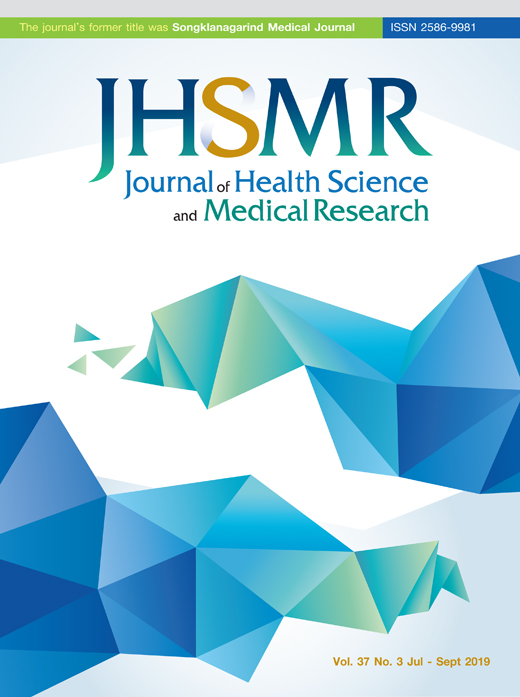Roxithromycin as Anti-Inflammatory Drug Improves Clinical Outcomes in Adult Patients with Bronchiectasis: A Double- Blinded Randomized, Placebo-Controlled Pilot Clinical Trial
DOI:
https://doi.org/10.31584/jhsmr.201956Keywords:
anti-inflammatory, bronchiectasis, macrolide, roxithromycin, treatmentAbstract
Objective: Macrolides are anti-inflammatory agents that have been reported to improve symptoms in bronchiectasis. The objectives of this study were roxithromycin 300 milligrams (mg) once daily for 8 weeks in patients with bronchiectasis improves the symptom scores as the primary outcome, and the pulmonary function tests and quality of life as the secondary outcomes.
Material and Methods: This was a randomized double-blinded placebo-controlled trial of roxithromycin or placebo once daily for 8 weeks in patients with bronchiectasis. Symptom scores, pulmonary function tests, St. George’s Respiratory Questionnaire (SGRQ), and sputum culture were done at each visit.
Results: Twenty-eight bronchiectasis patients with a mean age of 56 years participated in this study. Fourteen patients were randomized to receive either roxithromycin 300 mg or placebo once daily. Roxithromycin was shown to improve symptom scores (mean difference of symptom scores=–1.66, p-value=0.005) compared with placebo (mean difference of symptom scores=-0.06, p-value=0.94). Quality of life assessed by the SGRQ, significantly improved in the roxithromycin group (p-value=0.012) but not in the placebo group (p-value=0.84). Pulmonary function tests (forced expiratory volume in one second, forced vital capacity, and diffusing lung capacity of the lung for carbon monoxide) did not improve in either group. None of the patients in the roxithromycin group reported any adverse effects.
Conclusion: Roxithromycin once daily showed benefits in clinical outcomes such as symptoms and quality of life. Larger studies of the effects of roxithromycin in bronchiectasis with longer follow-up should be done.
References
2. Barker AF. Bronchiectasis. N Engl J Med 2002;346:1383-93.
3. Cole P. Inflammation: a two-edged sword-the model of bronchiectasis. Eur J Respir Dis Suppl 1986;147:6–15.
4. Moulton BC, Barker AF. Pathogenesis of bronchiectasis. Clin Chest Med 2012;33:211–7.
5. Crosbie PAJ, Woodhead MA. Long-term macrolide therapy in chronic inflammatory airway disease. Eur Respir J 2009;33:171-81.
6. Serisier DJ, Martin ML, McGuckin MA, Lourie R, Chen AC, Brain B, et al. Effect of long-term, low-dose erythromycin on pulmonary exacerbations among patients with non–cystic fibrosis bronchiectasis. The BLESS randomized controlled trial. JAMA 2013;309:1260-7.
7. Wong C, Jayaram L, Karalus N, Eaton T, Tong C, Hockey H, et al. Azithromycin for prevention of exacerbations in noncystic fibrosis bronchiectasis (EMBRACE): a randomised, double-blind, placebo-controlled trial. Lancet 2012;380:660–7.
8. Altenburg J, de Graaff CS, Stienstra Y, Sloos JH, van Haren EH, Koppers RJ, et al. Effect of azithromycin maintenance treatment on infectious exacerbations among patients with non–cystic fibrosis bronchiectasis. The BAT randomized controlled trial. JAMA 2013;309:1251-9.
9. Nakamura H, Fujushima S, Inoue T, Ohkubo Y, Soejima K, Waki Y, et al. Clinical and immunoregulatory effects of roxithromycin therapy for chronic respiratory tract infection. Eur Respir J 1999;13:1371-9.
10. Liu J, Zhong X, He Z, Wei L, Zheng X, Zhang J, et al. Effect of low-dose, long-term roxithromycin on airway inflammation and remodeling of stable noncystic fibrosis bronchiectasis. Mediators Inflamm 2014;2014:708608.
11. Wu Q, Shen W, Cheng H, Zhou X. Long-term macrolides for non-cystic fibrosis bronchiectasis: a systematic review
and meta-analysis. Respirology 2014;19:321-9.
12. Young RA, Gonzalez JP, Sorkin EM. Roxithromycin: a review of its antibacterial activity, pharmacokinetic properties and clinical efficacy. Drugs 1989;37:8-41.
13. Surendra K, Puri B, Howard BL. Roxithromycin: a pharmacokinetic review of a macrolide. J Antimicrob Chemother 1987;20:89-100.
14. Suzaki H, Asano K, Ohki S, Kanai K, Mizutani T, Hisamitsu T, et al. Suppressive activity of a macrolide antibiotic, roxithromycin, on pro-inflammatory cytokine production in vitro and in vivo. Mediators Inflamm 1999;8:199-204.
























